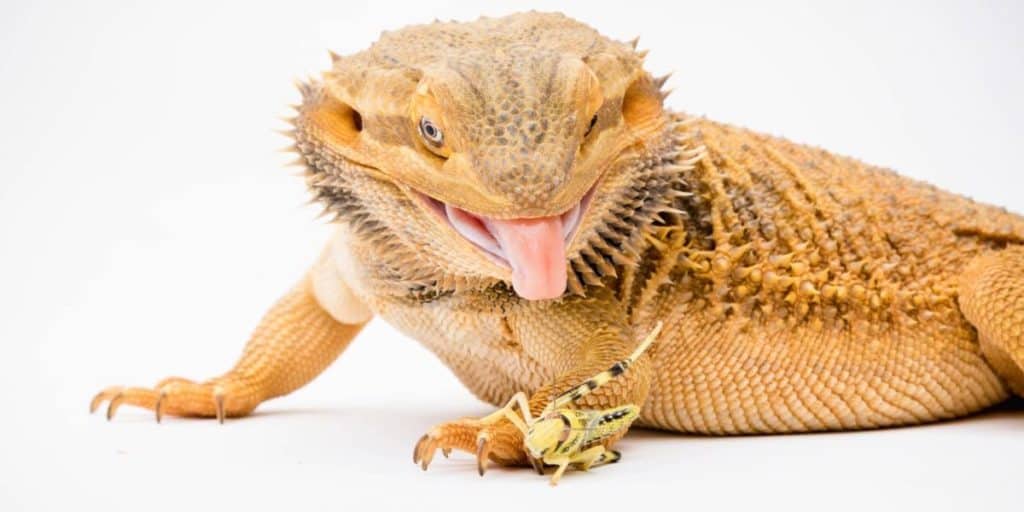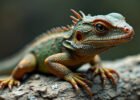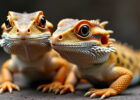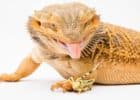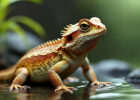Bearded Dragon Diet: A Comprehensive Guide to What Your Dragon Should Eat
Unlock the secrets to a thriving bearded dragon with our comprehensive guide to their diet! Learn the perfect balance of nutritious insects and vibrant veggies for every stage of life. Discover hidden dangers to avoid, gut-loading tips for optimal nutrition, and creative feeding strategies to keep your scaly friend happy and healthy. This in-depth guide equips you with the knowledge to fuel your bearded dragon’s fire for a long and fulfilling life.
While the ratio between livefood and greens will vary depending on the age of your beardie, the foods which they can eat more or less remains the same.
TL:DR
Insects and worms are the main source of protein for bearded dragons. They should make up 30% (adult) to 70% (juvenile) of their diet, depending on their age and activity level. Some of the best insects and worms to feed your bearded dragon are crickets, dubia roaches, mealworms, waxworms, silkworms, hornworms, and phoenix worms. You should avoid feeding your bearded dragon insects that are too large, too hard, or too toxic, such as fireflies, beetles, wasps, or wild-caught insects. You should also dust the insects with calcium and vitamin supplements before feeding them to your bearded dragon.
Leafy greens, vegetables, and fruits are the main source of vitamins, minerals, and fiber for bearded dragons. They should make up 30% (juvenile) to 70% (adult) of their diet, depending on their age and activity level. Some of the best leafy greens and vegetables to feed your bearded dragon are collard greens, dandelion greens, mustard greens, turnip greens, kale, bok choy, broccoli, squash, carrots, sweet potato, bell pepper, cilantro, parsley, and basil. Some of the best fruits to feed your bearded dragon are apple, banana, mango, papaya, melon, berries, grapes, kiwi, and figs. You should avoid feeding your bearded dragon vegetables and fruits that are too high in oxalates or goitrogens (such as spinach or cabbage), too acidic (such as citrus fruits), too watery (such as iceberg lettuce or cucumber), or too sugary (such as dates or raisins). You should also chop the vegetables and fruits into small pieces before feeding them to your bearded dragon.
Bearded dragons need fresh water every day to stay hydrated. You can provide water in a shallow dish or spray it on the food or the enclosure walls. You should avoid using tap water that contains chlorine or fluoride. You should also change the water daily and keep it clean.
Bearded dragons have different dietary needs at different stages of their life. Baby bearded dragons need more protein and less plant matter than adult bearded dragons. They should be fed insects three times a day and vegetables once a day. Juvenile bearded dragons need more plant matter and less protein than baby bearded dragons. They should be fed insects twice a day and vegetables twice a day. Adult bearded dragons need more plant matter and less protein than juvenile bearded dragons. They should be fed insects once a day and vegetables once or twice a day.
Bearded dragons can eat a wide range of foods that provide them with the nutrients they need to grow and thrive. However, you should always do your research before introducing any new food to your bearded dragon’s diet. You should also monitor your bearded dragon’s health and behavior regularly and consult a veterinarian if you notice any signs of illness or distress.
Table of what bearded dragons can and cannot eat from various insects, fruits to vegetables
| Food | Type | Frequency |
|---|---|---|
| Acorn Squash | Veg | Often |
| Apples | Fruit | Occasional |
| Apricots | Fruit | Occasional |
| Artichoke | Veg | Occasional |
| Asparagus | Veg | Often |
| Avocado | Veg | Never |
| Banana | Fruit | Occasional |
| Beet Greens | Veg | Occasional |
| Beets | Veg | Occasional |
| Bell Pepper | Veg | Often |
| Blackberries | Fruit | Occasional |
| Blueberries | Fruit | Occasional |
| Bok Choi | Veg | Occasional |
| Boxelder Bugs | Bugs | Never |
| Broccoli | Veg | Often |
| Brussel Sprouts | Veg | Occasional |
| Butternut Squash | Veg | Often |
| Butterworms | Bugs | Occasional |
| Cabbage | Veg | Occasional |
| Carrot tops | Veg | Often |
| Carrots | Veg | Occasional |
| Cauliflower | Veg | Occasional |
| Celery | Veg | Occasional |
| Chayote | Veg | Occasional |
| Cherries | Fruit | Occasional |
| Chicory | Veg | Often |
| Cilantro | Veg | Occasional |
| Citrus Fruit | Fruit | Never |
| Clover | Veg | Often |
| Collards | Veg | Often |
| Coriander | Veg | Often |
| Courgette | Veg | Often |
| Cranberries | Fruit | Occasional |
| Crickets | Bugs | Often |
| Cucumber | Veg | Occasional |
| Dandelion | Veg | Often |
| Dates | Fruit | Occasional |
| Dubia Roaches | Bugs | Often |
| Earthworms | Bugs | Occasional |
| Elderbugs | Bugs | Never |
| Endive | Veg | Often |
| Escarole | Veg | Often |
| Figs | Fruit | Occasional |
| Fireflies / Glowing Insects | Bugs | Never |
| Grapefruit | Fruit | Never |
| Grapes | Fruit | Occasional |
| Green Beans | Veg | Often |
| Guava | Fruit | Occasional |
| Hornworms | Bugs | Occasional |
| Kale | Veg | Often |
| Kiwis | Fruit | Occasional |
| Kohlrabi | Veg | Often |
| Lemons | Fruit | Never |
| Lentils | Veg | Never |
| Lettuce | Veg | Never |
| Limes | Fruit | Never |
| Locusts | Bugs | Often |
| Mango | Fruit | Often |
| Mealworms | Bugs | Occasional |
| Melons | Fruit | Occasional |
| Mushrooms | Veg | Never |
| Mustard Greens | Veg | Often |
| Nectarine | Fruit | Never |
| Okra | Veg | Often |
| Oranges | Fruit | Never |
| Papaya | Fruit | Often |
| Parsley | Veg | Often |
| Parsnips | Veg | Often |
| Pattypan Squash | Veg | Occasional |
| Peaches | Fruit | Occasional |
| Pears | Fruit | Occasional |
| Peas/Snap Peas | Veg | Often |
| Phoenixworms | Bugs | Occasional |
| Pineapple | Fruit | Occasional |
| Pinkies | Other | Never |
| Plantain Leaves | Veg | Often |
| Plums | Fruit | Occasional |
| Pomegranate | Fruit | Occasional |
| Prickly Pear | Fruit | Often |
| Prunes | Fruit | Occasional |
| Pumpkin | Veg | Occasional |
| Radicchio | Veg | Often |
| Raisins | Fruit | Occasional |
| Raspberries | Fruit | Occasional |
| Redworm | Bugs | Occasional |
| Rhubarb | Veg | Never |
| Rocket | Veg | Often |
| Rutabagas | Veg | Occasional |
| Silkworms | Bugs | Occasional |
| Soldier Fly Larvae | Bugs | Occasional |
| Spinach | Veg | Occasional |
| Starfruit | Fruit | Occasional |
| Strawberries | Fruit | Occasional |
| Superworms/Kingworms (Morioworms) | Bugs | Occasional |
| Sweet Potato | Veg | Often |
| Swiss Chard | Veg | Occasional |
| Tomatoes | Veg | Occasional |
| Turkistan Roaches | Bugs | Often |
| Turnip Greens | Veg | Often |
| Watercress | Veg | Often |
| Waxworms | Bugs | Occasional |
| Wildcaught Bugs (Indoors or Outdoors) | Bugs | Never |
| Yams | Veg | Occasional |
| Yellow Squash | Veg | Often |
| Zucchini | Veg | Occasional |

